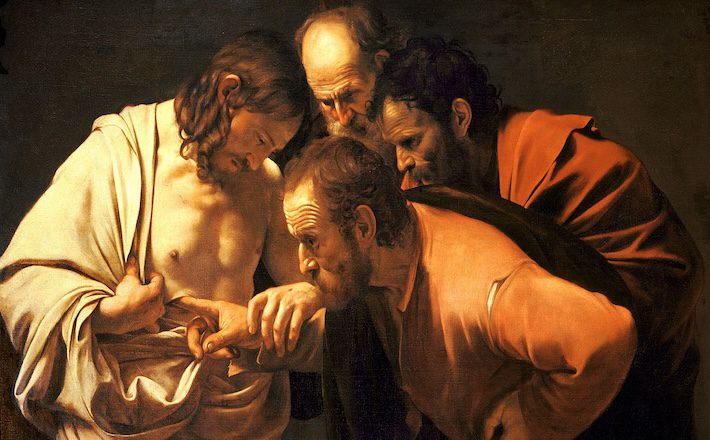
#image_title
John 20:19-31
I don’t think Thomas is as much a doubter as he is a realist. Think about it. Everything we know about Thomas up to this point suggests that he is forthright, genuine, and even courageous. Way back in chapter 11, for instance, Thomas is the one who urged the disciples to go with Jesus to raise Lazarus even thought it might spell their deaths (Jn. 11:16). And in chapter 14, when Thomas doesn’t understand Jesus’ metaphorical speech about the place he is going to, Thomas calls him on it: “Lord, we do not know where you are going, how then can we know the way.”
Thomas, I think, is someone who likes his truth straight up and who takes stock of the situation before making a decision. You can count on Thomas, but you’d better not be a pretender with him, because Thomas doesn’t suffer fools easily.
From this point of view, it’s interesting to me that Thomas wasn’t with the other disciples in the upper room when Jesus first appeared. Actually, I should describe it differently: Thomas wasn’t with the other disciples when they were cowering in fear in the upper room. We don’t know where he was, but I’m guessing he was out getting on with his life, figuring out what was going to come next and getting on with it. Because Thomas is, first and foremost, a realist.
And here’s the thing: reality came like never before on that Friday just two days before this scene, when Thomas watched as they nailed his Lord, teacher, and friend to a cross made of wood. Jesus was dead, and with him all the hopes and dreams of the past three years had perished as well.
So when the disciples come saying that they had seen Jesus, Thomas doesn’t merely doubt them. He out and out just plain doesn’t believe. And so I suspect that his demand to see and feel the mark of the nails in Jesus’ hands is less a request for proof than it is mocking the disciple’s claim. He makes that demand, in other words, because he knows it will never happen; it’s a request as absurd, even ridiculous, as what his friends are claiming.
Which leads me to believe that what changes when Thomas is confronted by the risen Lord is not that he is no longer a doubter – he never really was – and certainly not his realism. No, what changes is his perception of reality itself. Of what is possible. Of what God can do. Even of what God can do through him.
Jesus comes and takes his mocking words and turns them back on him, not to humiliate or scold him, but simply to confront him with the possibility that his reality was too small, his vision of what is possible too limited. And when Jesus calls him to faith, he’s actually inviting him to enter into a whole new world.
And this issue of having too small a vision of reality is what I find interesting. Because I also fall into a worldview governed by limitations and am tempted to call that “realism.” Which is when I need to have the community remind me of a grander vision. A vision not defined by failure but possibility, not governed by scarcity but by abundance, not ruled by remembered offenses but set free by forgiveness and reconciliation.
Can we possibly imagine that we are invited into a whole new reality? That part of what it means to come to church is to have
our view of the world challenged with the possibility of something more? Don’t get me wrong – this isn’t about scolding people. Life is real, and life is hard, and sometimes life is real hard, and if our vision shrinks it’s usually during the stress of personal hardship and tragedy. And don’t forget that we are bombarded 24/7 with headlines about all that’s wrong in the world. “If it bleeds, it leads,” may sell newspapers and internet ads, but it also leads us to believe the worst of the world.
There’s a scene from King Lear – that comes to mind from my English Lit. days. It’s when mad old Lear encounters his daughter Cordelia, the loving daughter he foolishly shunned. Precisely because Lear is a realist, he expects to receive from her what he knows he deserves, what he has coming by all the laws of the land and human experience. When, contrary to expectation or reason, she forgives him, however, Lear is disoriented and asks, “Am I in France?” His servants, thinking him still mad, reply, “In your own kingdom, sir.” Yet Lear has left his realistic England and has been caught the reality- expanding, world-creating experience of grace, mercy, and forgiveness.
“Do not continue disbelieving, but instead believe…in God, in grace, in mercy, in possibility, in forgiveness…and in yourself.” And believe in this new reality that the resurrection of Jesus creates for us. For it is by grace you have been saved.
There are, I suspect, a lot of Thomases out there this morning, including myself. We should not have to surrender our sense of realism, but instead invite one another to a whole new reality that God created. That new reality began when God first raised Jesus from the dead, but it continues, grows, and expands each
time we gather in the name of our resurrected Lord and each time we will enter our newly re-modeled sanctuary and each time we welcome a new person into the body of Christ through Baptism. For with Christ, all things are possible. This is our new reality.
Amen.

